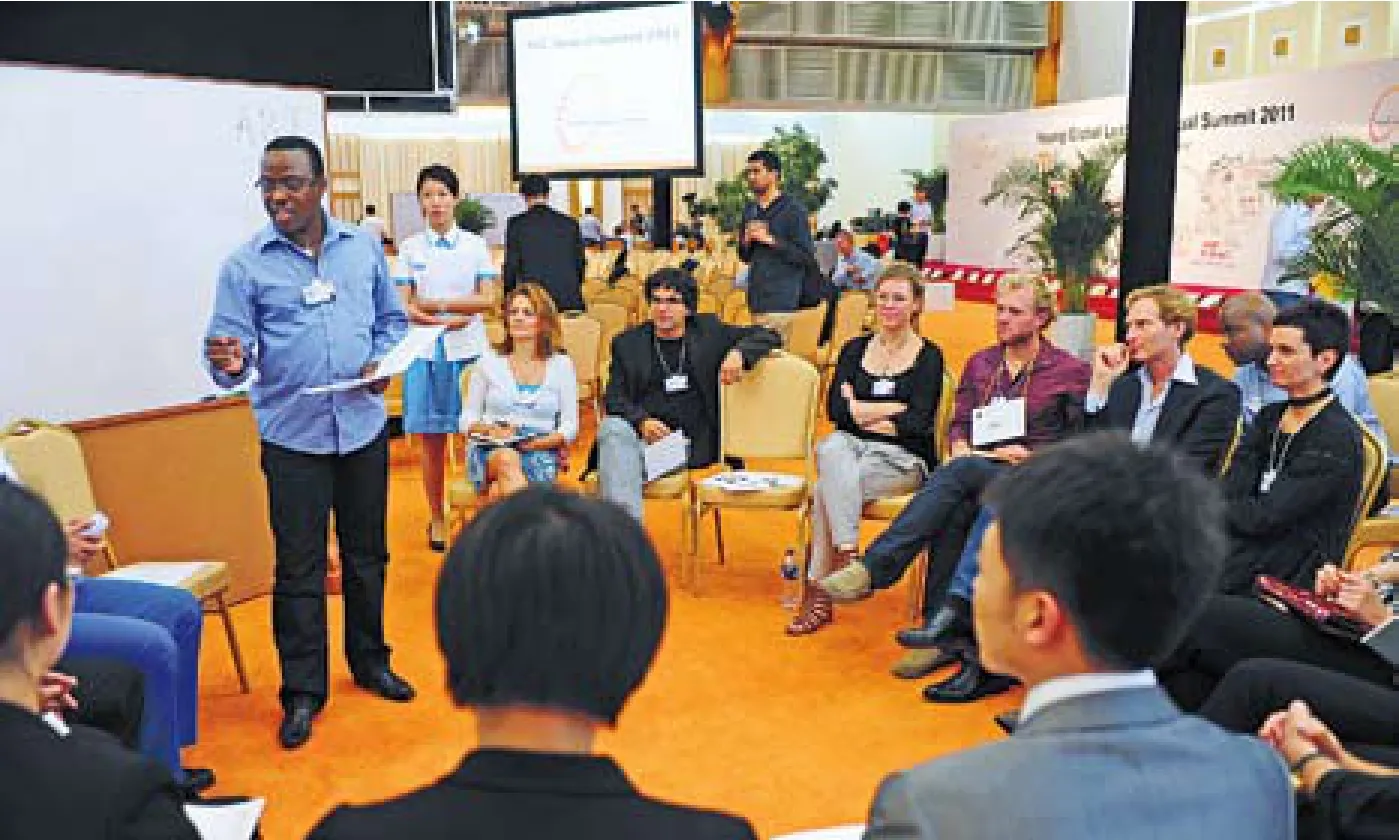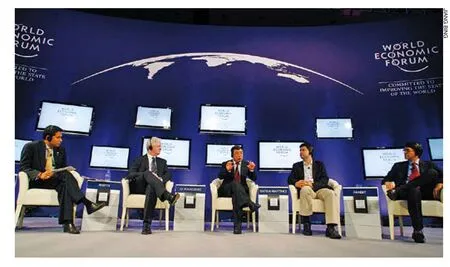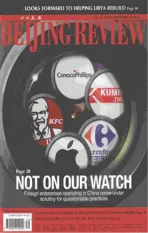Prospects in the Spotlight
2011-10-14ByHUYUE
By HU YUE
Prospects in the Spotlight
By HU YUE
The quality of China’s economic growth is examined at the 2011 Summer Davos
The Chinese economy is growing,but at a slower pace. Is this growth healthy and sustainable? The question was on the minds of many economists gathered in Dalian, capital of China’s northeast Liaoning Province, for the World Economic Forum (WEF), September 14-16.
The domestic economic landscape is anything but fl at. In fl ation is easing, although still worryingly high. The United States has left open the possibility of a third round of quantitative easing, threatening to complicate in fl ation in China. Meanwhile, crisis-stricken exporters are regaining lost ground, but clouds are gathering over their prospects due to uncertainties facing Western economies.
The once-sizzling growth engine has showed signs of tapering off. As China twists harder on credit screws to tame stubborn in fl ation, worries abound that the country has gone too far in tightening its monetary policy and may suffer a sharper slowdown.
Despite the headwinds, China remains a calm port while storms sweep through the developed world. In addition, China improved its ranking from 27th to 26th on the WEF’s Global Competitiveness Report 2011-12,while the United States continues the decline it began three years ago, falling one more place to the fi fth position.
“China is one of the world’s least indebted countries, boasting a high savings rate and moderate budget de fi cits,” said the report.“Those factors, combined with a favorable macroeconomic environment and relatively high standards in healthcare and basic education, contributed to an improvement in competitiveness.”
However, the report points out that China’s fairly poor results in fi nancial market development and technologies are pulling down its overall competitiveness.
Given the complicated situation, many people looked to the five-day meeting,which adopted the theme Mastering Quality Growth, for insights on China’s economic outlook. The meeting brought together more than 1,500 industrial and government leaders from at least 90 countries and regions, representing a 10-percent increase in participation from 2010.
The WEF began hosting annual meetings in the Swiss skiing town Davos in 1971.In September 2007 the WEF held the first Summer Davos Forum in China as the world became increasingly interested in the thriving Chinese economy.
Slower, healthier
China’s GDP growth for the second quarter dropped to 9.5 percent from 9.7 percent in the first quarter. Though well below the turbo-charged growth rate it previously enjoyed, the progress should still be the envy of the recession-weary Western world.
“Quality growth should be a comprehensive, balanced and sustainable growth,” said Premier Wen Jiabao at the forum. “In addition,the economy should maintain a relatively rapid growth rate with a low level of in fl ation,” he said.
“Hi-tech, low-carbon and environmentally friendly industries should be driving forces of China’s quality growth,” he said. “To achieve that, the country must properly shrink the ruralurban divide, foster technological research and development, and reduce carbon emissions and heighten energy ef fi ciency.”
The goal is to share the economic bene fi ts with the Chinese citizens and improve their livelihood, as well as accelerate social progress, he added.
“The lower speed of growth is mostly the result of proactive macro-regulation,” said Li Daokui, member of the Monetary Policy Committee of the People’s Bank of China and Director of the Center for China in the World Economy at Tsinghua University.
For example, the government has stepped up a stringent clampdown on the sizzling real estate industry, taking some steam out of the vibrant economy, said Li. As a pillar force of the economy, the property sector previously contributed at least 2 percentage points to the annual growth rate.
“But it is well worth the effort as the slowdown provided a powerful catalyst for the country to rebalance its economy,” he said.
There is no need to worry about a hard landing since the foundations of the economy—investment and consumption—remain solid, he added.
Jing Ulrich, Managing Director and Chairman of China Equities at J.P. Morgan,said China’s efforts to optimize the growth model are already bearing fruit.
“We are glad to see that China’s dependence on exports is decreasing,” she said. “In the first half of this year, foreign trade had a negative impact on growth, with the trade surplus shrinking signi fi cantly.”
Klaus Schwab, founder and Executive Chairman of the WEF, believes another challenge for China is to narrow the widening gap between rich and poor provinces.
“Moreover, it is necessary to strike a balance between consumption, investments and exports on the one hand, and the economy,ecology and environment on the other,” he said.

BETTER GROWTH: Business leaders from all over the world participate in a group discussion about China’s sustainable future at the Summer Davos in Dalian, northeast China’s Liaoning Province

INNOVATION MATTERS:Business leaders discuss the importance of innovation for the Chinese economy at a sub-forum at the Summer Davos
With the benefits of low labor costs diminishing, China has to move up on the ladder of industrial production and make a push into high technologies, Schwab said.
“The world now sees China mainly as a production place, but in my opinion, China, in the future, will become a formidable force in terms of technology and research,” he said.
New frontiers
As China seeks to embark on a more sustainable path of growth, an array of emerging industries are showing potential to fill the blank left by waning exports.
“The next gold mine of China will be the green economy,” said James Cameron,Vice Chairman of Climate Change Capital, a London-based investment management and advisory fi rm.
“Stimulus for the green economy and growing customer interest have provided Chinese firms with the opportunity to reap pro fi ts and expand green technology development,” he said.
Success with electric car technology has given China a head start in the global race to a low-carbon economy. The country has also made pushes into wind and hydropower to offer relief from its reliance on coal.Meanwhile, it has stepped up a clampdown on energy-guzzling industries like cement and steel, though the move requires a compromise on economic growth.
Malini Mehra, founder and CEO of the Center for Social Markets, an Indian nonprofit organization promoting responsible entrepreneurship and sustainable development, said there are two ways in which the governments can support low-carbon businesses to continue along a “green” path.
“The first is to provide some means of recognizing their good work,” she said. “And the second is building a measuring system to verify which company is actually doing well,not just talking about doing well.”
Guo Shuqing, Chairman of China Construction Bank, said the service sector, including fi nancial and tourism industries, also has the chance to shine as the country gears up to boost domestic demands.
In 2010, the service sector accounted for 43 percent of the Chinese economy, up from 40.5 percent in 2005. The government has set the goal of raising the share to 47 percent by 2015.
“Commercial banks will also extend credit support to service companies and soothe financing difficulties of the smaller fi rms,” said Guo.
Cordon Orr, Chairman of McKinsey Asia, said modern agriculture will also become a bright spot on China’s economic landscape over next few years.
“Agriculture is the foundation of economic take-off and its prosperity holds key to China’s sustainable development,” he said.“A lot of multinationals have shown interest in the sector, and massive investments are expected to pour into businesses like fertilizer production, seed planting and agricultural product supplies.”
Li Daokui said the Chinese economy is able to thrive for another three decades,drawing strength from ongoing urbanization,vibrant consumptions and infrastructure construction including water resource facilities.
“China still lags far behind developed countries in terms of the urbanization rate,which means the country has a great potential to play a swift catch-up,” he said.
Reforms underway
As China prioritizes quality growth, the forum’s participants believe a necessary step is to deepen domestic reforms and address problems glossed over in past boom times.
Zhang Xiaoqiang, Vice Chairman of the National Development and Reform Commission, said the most urgent task is to overcome system barriers hindering integration between urban and rural areas.
“In addition, policymakers must properly repair the social security network and remove much of the anxiety that makes residents prone to save,” he said.
In the latest move, China in July launched a new pension program for unemployed urban residents, widening its pension umbrella to cover all residents. Prior to this, the country had put in place a new rural cooperative medical system bene fi ting almost all Chinese farmers.
“The country would face growing financial pressures to strengthen its pension mechanism because of an aging society,”said Wang Feng, Director of the Brookings-Tsinghua Center for Public Policy.
Zhang Weiying, an economics professor of Peking University, stressed the importance of reforming the education system.
“As many Chinese companies graduate from low-cost manufacturing, they need more innovative talents in technologies and research and development,” said Zhang. “That is why we must shift the focus of education from teaching knowledge to fostering creativeness.”
“Meanwhile, it is necessary to match education with the needs in the job market, and enhance the students’ teamwork and communication skills,” he added.
Tian Lipu, Director of the State Intellectual Property Of fi ce, said China will also spare no effort to press ahead with its protection of intellectual property rights(IPR), and help enterprises translate innovations into productivity.
“China had a late start on IPR protection,but its progress is remarkable,” he said. “For instance, we have established more than 100 IPR protection centers across the country and set up hotlines to receive relevant complaints.”
